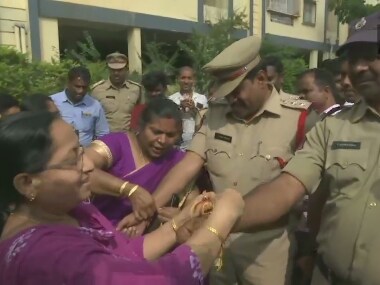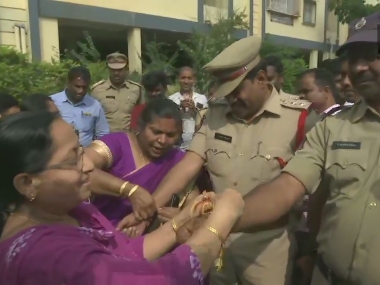It was not surprising to see calls for the lynching of the four men accused of rape in the Hyderabad case, but in spite of all the instances of social media bloodlust turning into actual murder, I did not expect to wake up to the news of the police killing the accused. Sure, they have claimed the shooting occurred during an escape attempt, but not even those offering this excuse really believe in it themselves. One can see this in DCW chairperson Swati Maliwal’s telling statement that if the justice system is not made stronger, then the police will “repeat these kinds of incidents much more.” [caption id=“attachment_7748231” align=“alignleft” width=“380”]  Neighbours of the Hyderabad rape victim tie rakhis for police personnel after the four accused were killed in an encounter. Photo courtesy ANI[/caption] The biggest tragedy is that such a move is not likely to make any significant dent in the problem of our country’s heinous rape culture. A 2018 study by Sharanya Basu Roy and Sayantan Ghosh Dastidar shows that there is no significant effect of deterrence factors on the incidence of rape, with the police often being seen by victims as part not of the solution, but of the problem. Study after study has shown that the Indian police persistently believe in ‘rape myths’ which end up further traumatising the victim rather than punishing perpetrators. The experience of neighbouring countries, like Pakistan, in instituting tough rape laws, including the death penalty, has also been poor. Far from reducing the incidence of rape, experts say what such laws did was actually deter the justice system from convicting perpetrators. Zainab Malik, who is part of a legal rights firm in Pakistan, told the BBC “police are biased against women and are hesitant to even register cases of gang rape as that would mean the death penalty for a group of men. To circumvent that, often the case would be registered against one man only." Quite unlike calls for killings, feminists have repeatedly called for much more comprehensive solutions. The findings of Roy and Dastidar’s study echo these calls in identifying social attitudes towards women as being the most robust predictor of incidents of this terrible crime. No amount of fast-tracking cases or extra-judicial murder can substitute for the crying need for more comprehensive reform, not just of our police, but also of what we teach our young boys and men, and the messages the media repeats. At the opposite end of the spectrum to these killings is the proven effectiveness of Kenyan NGO Ujamaa’s educational programme, aimed at boys. Teaching young men to intervene when they see the potential of an assault, and helping younger boys have conversations around sex that challenge rampant misogyny and the persistence of rape myths has been shown to be successful by a Stanford University study. Girls receive their own kind of training to help prevent sexual assault from Ujamaa. Meanwhile, an earlier intervention in the form of self-defence and empowerment classes for girls in Nairobi led to a 38 percent drop in rapes among adolescents in high-crime settlements within 10 months. Though under 2,000 girls were enrolled in the intervention, the skills taught were used to prevent as many as 817 sexual assaults during the study period.
If these killings are celebrated, and if Indians believe something like this solves the problem, the event will only further postpone the discussion of the real, deeper issue, and delay the urgent action required. If even half of those who were concerned and horrified will now step back, the pressure on politicians to act on this serious issue will flag before amounting to anything significant.
This is quite apart from the dangerous precedent the killings have set. That these killings have occurred in a case that was as high profile as this, and so much in the media glare, is terrifying. That terror is only increased when senior politicians like ex-Chief Minister Mayawati applaud this action, and encourage police departments in other states to follow suit. For some time now, our politicians have had an unhealthy focus on perception management at the cost of addressing real issues. That such a strategy has succeeded has not gone unnoticed. Indeed, it appears now that public opinion, even when it is very poorly informed and heedless of the cost, seems to have now become the basis for action to be taken by the administration. The lure of pandering to this kind of popular opinion nearly took us to the brink of war earlier this year. Now, it has set a dangerous precedent, where so long as enough people call for it, those under trial can be summarily shot. Just as the crowds were baying for the blood of these four accused, so too other crowds have bayed for the blood of journalists, activists and student protestors. And with today’s sophisticated propaganda methods, such a mob can be gathered in double-quick time to dangle before greedy politicians the incentive of popular support for taking so-called ‘decisive action’. Whatever and whoever has unleashed this bloodlust in our people, the genie, once out of the bottle, is hard to put back in. There seems to be some consensus across the political spectrum on this act being wrong. One can only hope that it is these voices that win out over the next few days, and convince people to continue to hold our governments accountable for real action on rape. If you haven’t spoken up as yet, please, for the sake of our country, do so now.


)

)
)
)
)
)
)
)
)



